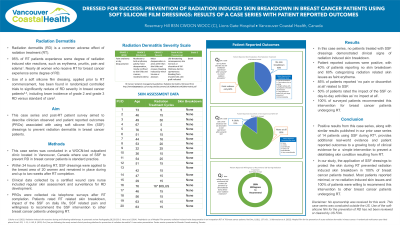Case Series/Study
(CS-080 (RPT-003)) Dressed for Success: Prevention of Radiation Induced Skin Breakdown in Breast Cancer Patients Using Soft Silicone Film Dressings-Results of a Case Series with Patient Reported Outcomes

The purpose of this case series and patient survey was to describe clinical and patient reported outcomes associated with using soft silicone film (SSF) dressings to prevent radiation dermatitis (RD) in breast cancer patients undergoing radiation treatment (RT). As a result of the randomized control study by Behroozian et al1 in Eastern Canada (December 2022), a similar approach of care was provided to women on the West coast of Canada.
Methods:
: Within 24 hours of starting RT, SSF dressings were applied to the breast area of 20 women and remained in place during and up to two weeks after RT completion. Clinical data collected by a certified wound care nurse included regular skin assessment and surveillance for RD development. Patient reported outcomes were collected via telephone surveys after RT completion and asked 20 participants to rate RT related skin breakdown, the impact of the SSF on daily life, SSF related pain and willingness to recommend the SSF intervention to other patients undergoing RT for breast cancer. In this case series, none of the patients treated with SSF demonstrated clinical signs of radiation induced skin breakdown. Patient survey results were positive with 40% of patients reporting no skin breakdown and 60% categorizing radiation related skin issues as faint erythema. All patients (100%) surveyed recommended this intervention for breast cancer patients undergoing RT. The application of SSF dressings to protect the skin during RT minimized radiation induced skin breakdown in 100% of breast cancer patients treated. Most patients reported minimal, or no radiation induced skin issues and 100% of patients were willing to recommend this intervention to other breast cancer patients undergoing RT. The adjuvant of RT is frequently prescribed for breast cancer patients, based on these results further study and consideration of SSF to prevent RD is recommended.
Results:
Discussion:

.jpeg)
